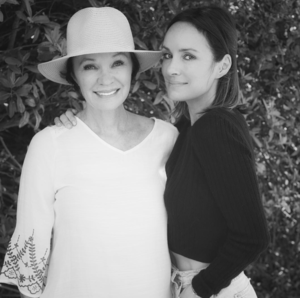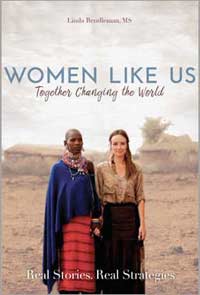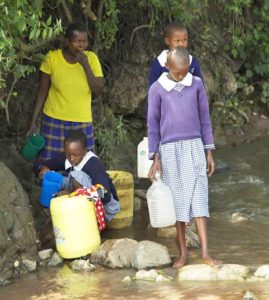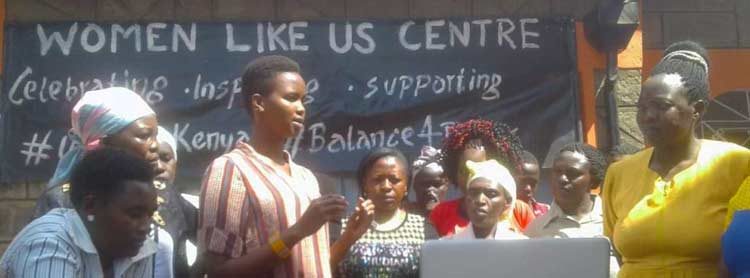We’re beginning plans for our next trip to Kenya in summer 2020 where we see the beautiful countryside, be a part of the communities of women we serve and volunteer and understand once again that the world is a small place, the hearts of all of us are the same, our stories and our lives are simply different. Please join our mailing list and newsletter for more information about this and other news.
Below is the introduction to the third Women Like Us book, Women Like Us. Together Changing the World. The stories of many amazing women are located here and I plan to share their stories with you over time. But in particular, I’m offering you the introduction written by my daughter Catt Sadler, celebrity host, writer and champion of women.
Catt tells a bit of her own story as well as the impact our tip made on her. This experience evolved into the documentary film Women Like Us. Three Journeys. One Mission. To Change the World.
Excerpt from Women Like Us. Together Changing the World. Written by Linda Rendleman with Introduction by Catt Sadler
I was born in 1974 in a small town in southern Indiana, with a population of about 10,000. All ‘folks’ were white, the majorityof them Christian, and although I would grow to love thislittle slice of the world and call it home, there is a portion ofMartinsville’s history I’m not particularly proud of. To this day,it’s still trying to shed its racist reputation.As I was growing up I heard stories about KKK rallies in thewoods, that the Grand Dragon himself called our communityhome, and that violence erupted because of this racism. Therewas a horrific tale about a black woman who came to town sellingencyclopedias door to door in the late ’60s who was stabbed todeath because of the color of her skin. These truths would hauntme as a child. I was instinctively saddened by the thought of whatlurked ‘yonder.’ Lucky for me, my parents were loving, inclusivepeople who, by example, taught me to love and accept my humanbrothers and sisters regardless of our differences.
Beyond race, though, my mother (like my late grandmother Freda) is a feminist. I was not only raised to respect other cultures and ideas, but women in my family were always cherished, and valued, and lifted up like any of our male counterparts.
Freda, my mom’s mom, was what we would today call a Girl Boss. And yes, she was even a little bossy. She was sassy and opinionated and incredibly driven.  She founded the first-ever female-owned real estate company in Indiana. She and my grandfather then raised three daughters of their own, and you can imagine that this was a house filled with girls with big dreams and big ideas.
She founded the first-ever female-owned real estate company in Indiana. She and my grandfather then raised three daughters of their own, and you can imagine that this was a house filled with girls with big dreams and big ideas.
These ideals were passed on generation to generation, and although my life began in a small town—literally next door to the one John Mellencamp sang about—I never imagined my journey would encompass the big wide world in the way that it has. I couldn’t see it as a little girl. I couldn’t predict it. But I think I always dreamt about it subconsciously.
I knew I would get “out,” and that there was more. I didn’t know what was in store, but there was definitely an itch as I grew older to discover what was outside the confines of Indiana life.
After graduating with a journalism degree from Indiana University and securing my first general-assignment reporting job at a local TV station, I began feeling very unsettled. No one in my entire family or extended family had ever left Martinsville “just because”. But in my heart and in my soul, I knew my life’s purpose would extend beyond the rolling hills, beautiful foliage and Hoosier hospitality my home had to offer.
Cut to 20 years later and here I am in Los Angeles, now with my own family, and boy has the view changed! I’ve worked 10 years now for the E! network and have interviewed Johnny Depp, Meryl Streep, Leonardo DiCaprio, Julia Roberts, and Oprah. Oh, and even a first lady: Michelle Obama. It has been hard work, day in and day out, but it has also been ridiculously glamorous, with red carpets, designer gowns, international travels covering the weddings of royals, French film festivals, and Olympic games. I have stamped my passport dozens of times over the years and have, as a result, discovered one of my absolute obsessions: traveling. I am completely infatuated by other cultures, their histories, their architecture, their customs, and their cuisine.
All the while I was raising my two sons and traveling the globe for my job, my mom had been steadily working on developing her foundation, Women Like Us. A cornerstone of her organization has been international travel. She would arrange for large groups of people to travel to an area in need of making change at some level, while also experiencing the richness of these places themselves.
In the summer of 2014, I would go to Kenya for the first time. Mom had planned for herself and a dozen other women to travel to a number of places to do work for the many causes her foundation supports there. At the time, it sounded thrilling, but like so many of us, I didn’t have a clue how I was going to leave my kids for nearly two weeks and take time off work, and on top of that, my dad had been diagnosed with stage IV lung cancer.
I was resistant to going, but thankfully, my mother knows me well. She said, “Get on the plane.” And so, I did.
One foot on the ground in Nairobi and I knew I was a long, long way from Martinsville, Indiana. The political unrest in the country at the time was at an all-time high.
There were a number of soldiers pacing through the airport with machineguns, and similar armed men greeted us at our first stop, our hotel. Oddly, I wasn’t afraid. I was calm and eager to let this adventure unfold as it was intended. After all, this experience was in line with what I had always believed was my destiny in many ways.
In the days to come, I would be changed forever—so much so, it’s sometimes hard to find the words.
I would meet Mama Margaret who heads the Tenderfeet School in Kibera, one of the poorest and most dangerous places in Kenya and the largest urban slum in all of Africa. This light, this force of a woman, shared her selfless stories of teaching to dozens of orphans who otherwise wouldn’t have an education at all. Many of them were ill, living with HIV. She not only runs a school for them but takes many of them home and nurtures them around the clock. She was the first angel I would meet.
Then, there were the faces from the Nancy Noël Preschool. This is a school Women Like Us had supported for many years, but it was our first time visiting. I lost my breath; it was so tragic upon first glance. The need, the hunger for human touch. There were hundreds of hungry children who until our visit had never used a paint brush, had never blown through a recorder to make music, had never had their own backpack. Giving to these precious little people would be one of the most rewarding experiences of my life.
In the days to come on Rusinga Island I would meet Mary and her two sons, all three of them diagnosed with HIV. We were filming our documentary and she was brave enough to let us and our cameras into her home. There were mud floors and mosquito nets over pieces of foam on the floor that served as their beds. Mary, somewhat hesitantly and certainly embarrassed, would describe her desperation to earn money to care for her kids. Work was hard to come by and she confessed to selling her body for money, as it was the only way to make ends meet. Her kids needed medication and food and shelter, and after her husband died from AIDS, like so many do, this was her life. I remember hugging them all tightly. I wanted to fix it. Right then and there. I felt hollow and helpless but was grateful to have collided with them on this big planet of ours.
I’m rarely speechless, but after that visit I remember feeling silenced.
Less than 24 hours after that I would interview the former first lady of Kenya, as if some miracle dropped out of the sky. She and her husband ascended on the lodge where we were staying, and while our group was gathered around a table in a common area, she walked by and her presence was electric! We persuaded her to have a glass of wine with us where we would learn she was a political powerhouse in Kenya who had
dedicated her life to empowering young girls in education and other areas. She agreed to be interviewed by me for our documentary. Her story is incredibly riveting, but also aspirational. Her life’s work: to make change for girls and future generations to come.
I had heard the phrase FGM in the news before, and I knew vaguely what it meant, but like so many of us who hear about tragic scenarios over and over again, sometimes we become immune to the true devastation taking place. The Olmalaika Home is a kind of refuge for victims of female genital mutilation. This is where I would meet  Jackie and Faith and so many other beautiful, resilient, smart, young women who wanted more for their lives. They often left their families to live in this safe, secure haven after being brutally victimized physically, mentally and emotionally. Kim DeWitt founded this home to give hope to these girls when the culture around them is telling them that their bodies aren’t their bodies, their worth is equal to that of a cow, their future isn’t their own.
Jackie and Faith and so many other beautiful, resilient, smart, young women who wanted more for their lives. They often left their families to live in this safe, secure haven after being brutally victimized physically, mentally and emotionally. Kim DeWitt founded this home to give hope to these girls when the culture around them is telling them that their bodies aren’t their bodies, their worth is equal to that of a cow, their future isn’t their own.
Jackie wants to be a doctor. Faith wants to find her own voice. Walking away from this place, unlike many other places I had encountered thus far, I felt hopeful. Because of one woman, Kim, and her courage to do something, I started to see the possibilities of giving the downtrodden a better life.
In bed at night, I wept…more than once. These people had gotten into my bones and I felt this overwhelming responsibility to combat the atrocities engulfing their lives. To heal them, to restore them, to protect them. I wanted to give to them because they had given to me. The light….
What I know is that there is poverty everywhere. There is need everywhere, in some form, within a mile of each of our homes. In Martinsville, in Los Angeles, in Africa. I was touched that my mom asked me to contribute to her book because I am such a believer in our connectedness as humans. I feel strongly that our collective purpose is to work together, regardless of race or origin. That it is our human right—our right as women—to find peace, good health, and education.
I hope you’ll read the pages of this book and be inspired.
Perhaps you, too, have the itch but need the nudge like my mom gave me. Go ahead, “get on the plane,” literally or metaphorically. You won’t regret it.
Catt


Post a comment